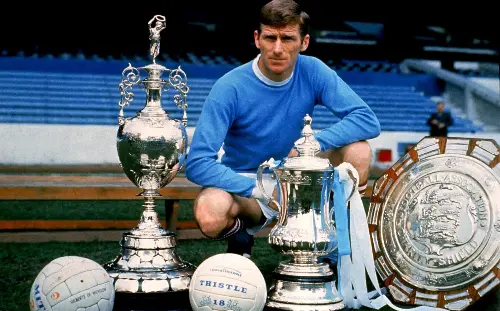
In the history of English football there can be few who have matched the dedication, commitment and loyalty to a single club that Tony Book demonstrated for Manchester City.
For more than five decades the man who has just died at the age of 90 was central to the place. He was the captain who lifted every domestic trophy and a European title too. He was the manager who won the last piece of silverware before a 34-year gap of disappointment. And perhaps more tellingly, he was prepared to stand in as interim boss not once but five times.
The truth is Book has every right to be considered City’s finest ever servant. What things he must have observed in his long, long association, as the club went from sparkling Sixties excellence, through decades of woeful mismanagement to the trophy-hoovering glories of today. Through it all he remained an unyielding presence, exuding calm, charm and constancy, the most loyal of loyalists.
How different his story was to that of the superstar millionaires currently occupying the City dressing room. Brought up as a child in India, where his father was stationed during the war, he didn’t become a professional footballer until he was 30. Though Malcolm Allison, the manager who bought him for Plymouth Argyle after the pair had met at Bath City, told him to pretend to the club directors that he was 28: nobody, Big Mal reckoned, would pay a fee for someone as old as he was.
When Allison moved to City in 1966, to become Joe Mercer’s assistant, never mind the fact the old boy was close to a footballer’s standard retirement age, he wanted Book to follow him. And how the full-back repaid his faith. Becoming club captain in his first season, he set about his task with extraordinary dedication. The experienced denizens of the dressing room really took to him, recognising the steely determination of the former bricklayer beneath his quiet exterior. From the off, this bunch of seasoned internationals referred to him as Skip, their respect total.
What an extraordinary late flowering he had. Under Skip’s captaincy, City won the Championship, the FA Cup and the League Cup, plus the European Cup Winners’ Cup. Strong, committed, unyielding, he was the ideal self-disciplined defensive foil for the extravagant attacking skills of Colin Bell, Mike Summerbee and Francis Lee. His contribution to the side was properly noted when he won the FWA Footballer of the Year title in 1969.
After he retired as a player in 1973, when he was on the verge of hitting his forties (though presumably everyone in Plymouth thought he was still in his mid-30s), the club were anxious not to lose his leadership qualities. He joined City’s coaching staff and when Johnny Hart was fired in October 1973 he was asked to hold the reigns until Ron Saunders arrived as boss. After Saunders left six months later, he was again given temporary charge. But so good were his man-management skills, not least as he presided over the famed derby win in April 1974, in which Denis Law backheeled Manchester United in the direction of the Second Division, he was given the job on a permanent basis. He was good at it too. In 1976 he took City to victory in the League Cup (becoming in the process the first man to win the trophy as both player and manager), before standing down in 1979, making room for his old mentor Allison’s return.
But he was back again in temporary charge a few months later when Allison was sacked, as he was when Mel Machin was let go in 1989 and Peter Reid departed in 1993. His was the steady hand on the tiller in time of crisis, always prepared to do his duty for the club he loved. Five times in all he stepped up, an extraordinary testament to his humility and commitment.
In later life, after he had retired from coaching and latterly scouting, he remained around the place at City, appointed honorary club president and, an indication of what he meant to the fans, life president of the supporters’ club. What changes he must have seen as, under Pep Guardiola and the Abu Dhabi ownership, the operation he once watched becoming a forlorn laughing stock was transformed into a winning machine.
It is an arc few have observed at such close quarters. He will have loved the new dominance, too. As anyone who ever encountered him in his long association will concur, despite being born in Bath, Book was light blue to the core; a proper City legend.